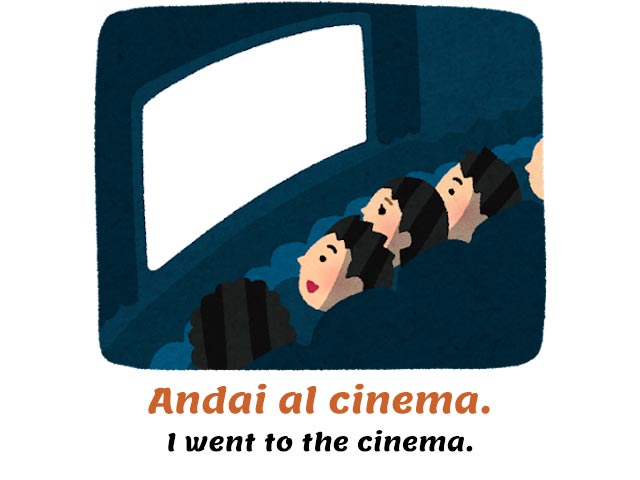Italian grammar
The passato remoto in Italian is the third most common past tense in the everyday language (the first would be the passato prossimo and the second the imperfetto), so it’s very important that you learn it well if you want to talk about past events with your Italian friends.
When do you use the passato remoto?
The passato remoto is mainly used in literature and history to talk about events that happened a long time ago. Its use in the spoken language is limited to the regional use of Italian in southern Italy. You will almost never hear it in movies and on the radio, for example, because it sounds kind of old-fashioned.
It’s usually the same as the English past simple tense, since we’re talking about events that began and ended in the past.
If it’s so rare, why do you need to learn how to conjugate verbs in this tense or at least how to recognize and understand them?
You see, almost all novels published in Italian, whether translated from other languages or written in this language, use a combination of the passato remoto and imperfetto tenses.
If you don’t learn at least the most common conjugations of the passato remoto in Italian, you won’t be able to read books in Italian. You need at least a passive knowledge of this tense to get by.
Il cacciatore catturò il cervo.
The hunter caught the deer.

Uses of the passato remoto
The passato remoto in Italian is used…
In all published books and novels told in the past tense (the vast majority).
Frodo raccolse l’anello.
Frodo picked up the ring.
Harry lanciò un incantesimo.
Harry cast a spell.
In southern Italy, it usually replaces the passato prossimo tense.
Tornammo dalla festa a mezzanotte.
We came back from the party at midnight.
L’altro giorno andai al cinema.
The other day I went to the movies.

When people recall very old events that they witnessed in the first person, they don’t use the passato remoto, but the trapassato prossimo tense (past perfect in English).
The passato remoto in Italian is reserved for very distant events that we are not emotionally involved with. For example, a history teacher might use this tense to talk about ancient Rome.
How do you form the passato remoto?
The passato remoto in Italian is very easy to conjugate because it’s not a compound tense. On the other hand, however, it features many irregular verbs, so you will have to do a lot of memorizing.
Conjugating regular verbs in the passato remoto
For regular verbs, just take the stem of the verb you want to conjugate and add these endings:
- -ai/-etti/-ii
- -asti/-esti/-isti
- -ò/-ette/-ì
- -ammo/-emmo/-immo
- -aste/-este/-iste
- -arono/-ettero/-irono
What’s the stem of a verb?
Italian infinitive verbs end in -ARE, -ERE and -IRE.
Cut off this part and you are left with the root verb.
Examples:
tremare ➡️ trem-
piovere ➡️ piov-
cucire ➡️ cuc-
Verb endings for passato remoto in Italian are added to these root forms of the verb for each person.
| pronoun | trovARE | dovERE | capIRE |
| io | trovai | dovetti / dovei | capii |
| tu | trovasti | dovesti | capisti |
| lui/lei | trovò | dovette / dové | capì |
| noi | trovammo | dovemmo | capimmo |
| voi | trovaste | doveste | capiste |
| loro | trovarono | dovettero / doverono | capirono |
For example, you can say…
Dovemmo uscire di casa all’alba.
We had to leave the house at dawn.
Trovammo un tesoro.
We found a treasure.

You will notice that for the -ERE verb class there are two possible conjugations for some persons. You can choose either one, but the ones ending in -etti/ette/ettero are much more common.
Irregular verbs in the passato remoto
I told you that there are many exceptions to the conjugations of the passato remoto in Italian. There are many irregular verbs that have an irregular stem only in some persons, while other verbs are completely irregular like essere, to be.
First, let’s see the conjugations for essere and avere.
Passato remoto of essere and avere
| essere | avere | |
| io | fui | ebbi |
| tu | fosti | avesti |
| lui/lei | fu | ebbe |
| noi | fummo | avemmo |
| voi | foste | aveste |
| loro | furono | ebbero |
You will notice that the verb avere is regular for some subjects and irregular for others. Many other verbs share this behavior!
Here are the passato remoto conjugations for some of the irregular verbs you will find in books.
| fare | to do, make | feci, facesti, fece, facemmo, faceste, fecero |
| stare | to stay | stetti, stesti, stette, stemmo, steste, stettero |
| dire | to say, tell | dissi, dicesti, disse, dicemmo, diceste, dissero |
| volere | to want | volli, volesti, volle, volemmo, voleste, vollero |
| chiedere | to ask | chiesi, chiedesti, chiese, chiedemmo, chiedeste, chiesero |
| rispondere | to reply | risposi, rispondesti, rispose, rispondemmo, rispondeste, risposero |
| andare | to go | andai, andasti, andò, andammo, andaste, andarono |
| venire | to come | venni, venisti, venne, venimmo, veniste, vennero |
| chiudere | to close | chiusi, chiudesti, chiuse, chiudemmo, chiudeste, chiusero |
| vedere | to see | vidi, vedesti, vide, vedemmo, vedeste, videro |
| guardare | to look at | guardai, guardasti, guardò, guardammo, guardaste, guardarono |
| rimanere | to remain | rimasi, rimanesti, rimase, rimanemmo, rimaneste, rimasero |
| prendere | to take | presi, prendesti, prese, prendemmo, prendeste, presero |
| dare | to give | diedi, desti, diede, demmo, deste, diedero |
| togliere | to take away | tolsi, togliesti, tolse, togliemmo, toglieste, tolsero |
| muovere | to move | mossi, muovesti, mosse, muovemmo, muoveste, mossero |
| leggere | to read | lessi, leggesti, lesse, leggemmo, leggeste, lessero |
| scrivere | to write | scrissi, scrivesti, scrisse, scrivemmo, scriveste, scrissero |
| rompere | to break | ruppi, rompesti, ruppe, rompemmo, rompeste, rompemmo |
| conoscere | to know | conobbi, conoscesti, conobbe, conoscemmo, conosceste, conobbero |
| sapere | to know | seppi, sapesti, seppe, sapemmo, sapeste, seppero |
| ridere | to laugh | risi, ridesti, rise, ridemmo, rideste, risero |
| piangere | to cry | piansi, piangesti, pianse, piangemmo, piangeste, piansero |
| nascere | to be born | nacqui, nascesti, nacque, nascemmo, nasceste, nacquero |
| crescere | to grow up | crebbi, crescesti, crebbe, crescemmo, cresceste, crebbero |
| morire | to die | morii, moristi, morì, morimmo, moriste, morirono |
| uccidere | to kill | uccisi, uccidesti, uccise, uccidemmo, uccideste, uccisero |
| cadere | to fall | caddi, cadesti, cadde, cademmo, cadeste, caddero |
| correre | to run | corsi, corresti, corse, corremmo, correste, corsero |
| decidere | to decide | decisi, decidesti, decise, decidemmo, decideste, decisero |
| vincere | to win | vinsi, vincesti, vinse, vincemmo, vinceste, vinsero |
| difendere | to defend | difesi, difendesti, difese, difendemmo, difendeste, difesero |
| perdere | to lose | persi, perdesti, perse, perdemmo, perdeste, persero |
| spendere | to spend | spesi, spendesti, spese, spendemmo, spendeste, spesero |

Examples using the passato remoto in Italian…
L’uomo non rispose alla domanda.
The man did not answer the question.
I ragazzi scrissero una frase sul muro.
The boys wrote a sentence on the wall.
Il pedone guardò a sinistra.
The pedestrian looked to the left.
Dicemmo la verità.
We told the truth.
Fu una splendida giornata.
It was a wonderful day.
Vidi un gufo sul ramo di un albero.
I saw an owl on the branch of a tree.

More free Italian resources
You might want to keep learning Italian online with these free Italian resources:
❤️ If you liked this lesson on the passato remoto in Italian, share it with your friends!


